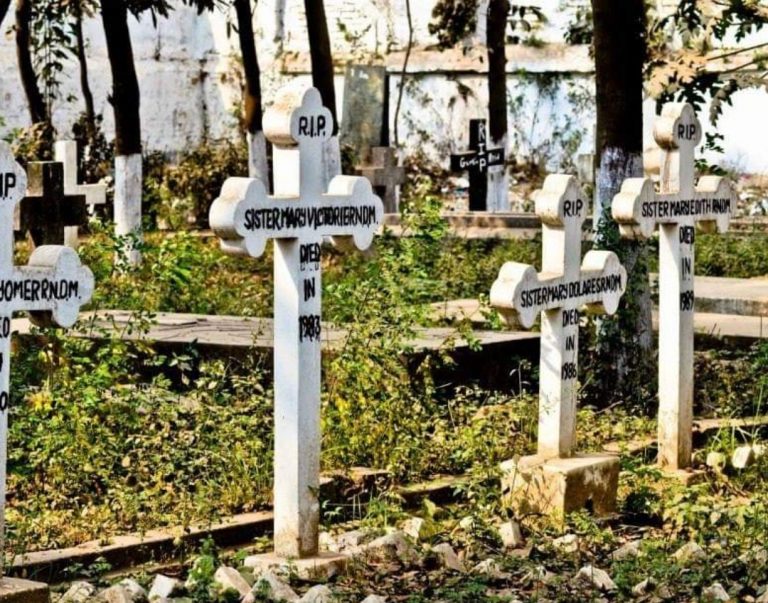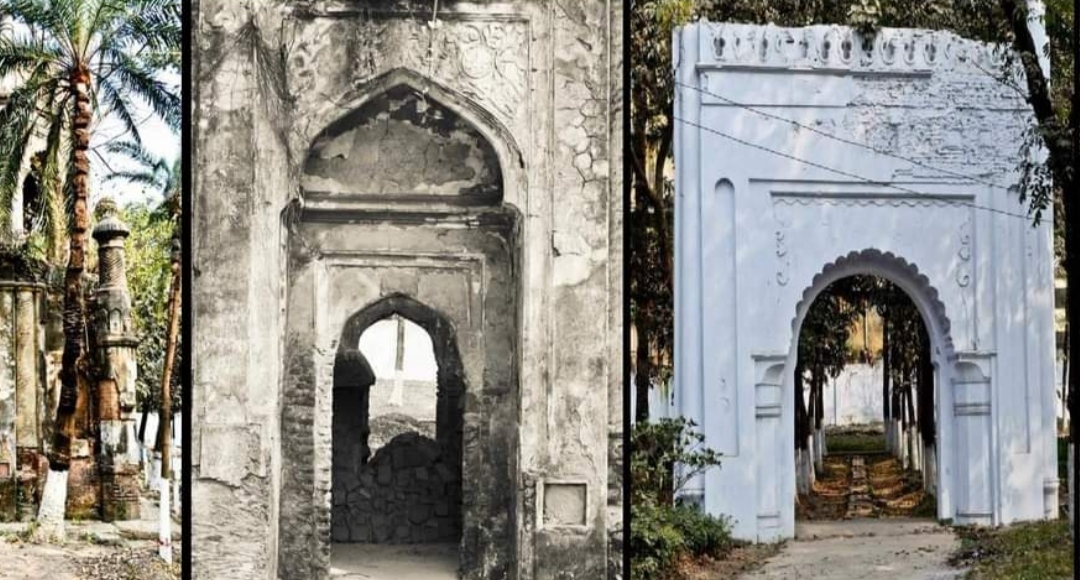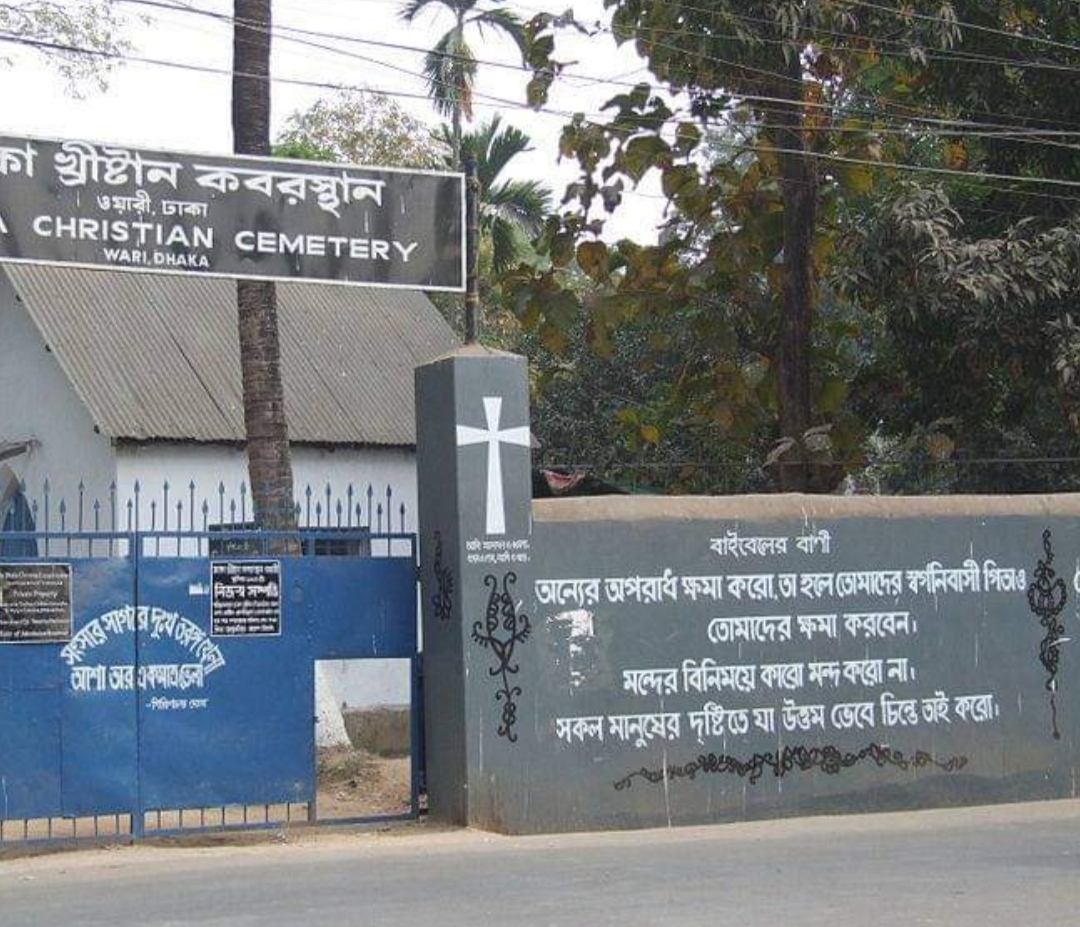
The paths of glory lead but to the grave!
By Nazarul Islam
Less than a mile from my house in Dacca lay the city’s Christian Cemetery, with its broken graves of Europe’s men and women. Five decades ago, I had made it a routine to visit this lifeless, cemetery that had already started to ruin. A notebook in hand I copied the drawings of old, fascinating graves and tombstones. I also copied the scriptures etched in faded English or Portuguese. I had saved them perhaps, for a future reference or recall.

Books reveal that this Christian Cemetery was developed mainly for the European traders and their families, thus most members of the East India Company lie buried there. The oldest grave there belongs to Reverend Joseph Paget, minister of Calcutta, who died there in 1724 at the age of 26.
This historical graveyard had been in a declining state since the early 1800s as noticed by both Reginald Heber, and F.B. Bradley Burt, although the decay had a more emotional romantic appeal to him. The original road layout of the cemetery has faded away with time, but it can be understood that a couple of straight roads intersected to make a path system within the network. The tombs were jumbled into a group to form one or two clusters, while making it hardly visible to visitors.
The structures built on top of graves had given me a strange vision—of dripping stone walls in uninhabited castles and of ivy-clad monastery ruins by moonlight, of locked inner rooms and secret dungeons, dank charnel houses and overgrown graveyards, of footsteps creaking upon staircases and fingers tapping at casements of howling and shrieking, groaning and scuttling and the clanking of chains, of hooded monks and headless horseman, swirling mists and sudden winds, insubstantial specters and sheeted creatures, vampires and bloodhounds, bats and rats and spiders, of men found at dawn and women turned white-haired and raving lunatic, and of vanished corpses and curses upon heirs.
When we visit a graveyard for the first time, it is scary and we take a different vow: Never to visit again. I was in my early teens and had read the legendary Elegy written in a country churchyard by Thomas Gray. In those days, I used to tell my mother that we friends would study together for exams but instead we would roam about the Ulsuru Lake.

Out of sheer curiosity, one evening, “The curfew tolls the knell of parting day” as per Grey, I found myself in the Narinda (or Wari) graveyard having entered there by mistake through broken boundary wall. Initially, I didn’t know where I was till I found a few alabaster stones with by-gone dates and a few simmering mounds of earth with firewood in the yonder. I had held my breath and ran through the length and exited by the Railway line.
I had restored myself with some roadside snack and returned home. But had vowed never to visit graveyard remained.
Of course, this vow was very short-lived, as I had to go there and to other burial locations in Azimpur, dozens of times as I lost several loved ones including my father, and my grandfather, uncles and aunties, as time went by.
But, what took the cake was visiting a graveyard without any compelling sad need. Charles Tucker my former English teacher at Notre Dame was driving me to Southampton to his brother’s home, and suddenly asked me, “Do you wish to stop by Stoke Poges, where Thomas Grey was buried.”
I remembered reading about the Churchyard, where Grey’s mother was originally buried and which probably influenced his poem. So we stopped, spent a while in the graveyard and the church where his poem is inscribed on the walls. Of all the lines, the ones which make a deep impression are:
The boast of heraldry, the pomp of pow’r,
And all that beauty, all that wealth e’er gave,
Awaits alike th’ inevitable hour.
The paths of glory lead but to the grave!
Well, needless to elaborate…The dead only knows their world. Graveyards have the dignity of air, and the authority of dust…
[author title=”Nazarul Islam ” image=”https://sindhcourier.com/wp-content/uploads/2021/05/Nazarul-Islam-2.png”]The Bengal-born writer Nazarul Islam is a senior educationist based in USA. He writes for Sindh Courier and the newspapers of Bangladesh, India and America. He is author of a recently published book ‘Chasing Hope’ – a compilation of his 119 articles.[/author]